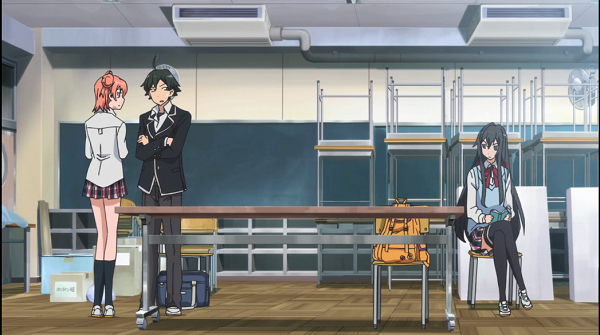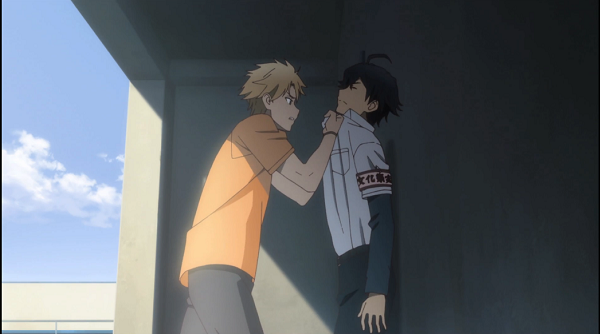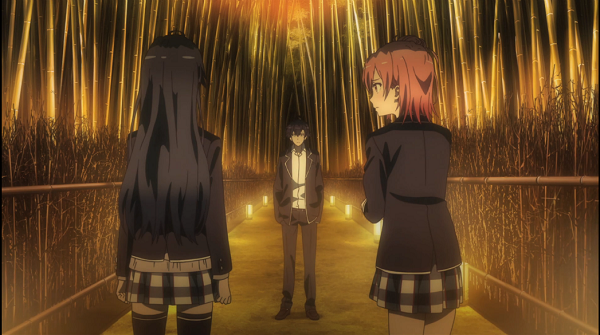 Yearn for the genuine, expect the mundane.
Yearn for the genuine, expect the mundane.
What They Say:
Opposites may attract—but combining them can also cause fires, electrocutions, and explosions!
When Hachiman Hikigaya, who has no friends and believes that anyone who likes high school is either deluded or a liar, is coerced into joining the “Services Club” run by Yukino Yukinoshita, who’s smart, attractive and considers everyone to be her complete inferior, it’s a catastrophe just waiting to happen. But it’s not until the THIRD ingredient… Yui Yuigahama, who’s cute, bright, cheerful, and needs help baking cookies… is added to the combustible mix that the sparks really start to fly. Is this a recipe for romance or a prelude to a nuclear meltdown? Get ready for rom-com gone totally wrong as the barrage a trois of the Service Club is unleashed on an unsuspecting student body in MY TEEN ROMANTIC COMEDY—SNAFU and MY TEEN ROMANTIC COMEDY—SNAFU TOO!
The Review:
Packaging:
Packaging for this release is somewhat peculiar. The front cover displays Yukinoshita holding a guitar from season 1’s finale, alongside Yuigahama with blue and pink scribbles (fireworks?) in the background. As memorable as the season 1 finale was, it’s not exactly iconic enough to represent the series as a whole, and is only made further odd by the fact that main character Hikigaya is nowhere to be seen on it. The same goes for the back cover where he’s only shown in small screencaps from the series, while Iroha from the second season is given a more prominent position.
Inner casing is par for the course, with the 4 discs being housed between two trays, both front and back. Each disc depicts a main girl from the series (Hikigaya again getting tossed to the wayside) in an art style more akin to the light novels the anime adapts. The blu-ray case itself is slightly thicker than your standard ones to fit the discs comfortably.
Menu:
The menu screen is straightforward enough, with a single shot of one of the characters in the background, while the menu options are in the lower right corner of the screen.
Extras:
Extras are a bit sparse, with the only additions being clean opening and ending credits. While the opening for each season is kept as its own option to choose from the menu, the all closings per season are combined into one longer video. A bit of a hassle if you want to skip to a specific closing animation, but nothing too major.
My Teen Romantic Comedy SNAFU (better known by some as My Youth Romantic Comedy Is Wrong, As I Expected or Oregairu) is an odd anime in that each season was animated by a different studio, resulting in very different tones between both.

The first season was animated by Brain’s Base, which is honestly a pretty hit-or-miss studio—its better known hits of Baccano, Durarara, and Mawaru Penguindrum being rare stand-outs among their ultimately forgettable library. Given the subject matter season 1 covers, though, I’d much rather Brain’s Base adapt this earlier material than plot points hit up later in the series. We begin with high schooler Hachiman Hikigaya: a cynical loner that ends up being punished for his behavior by joining the Service Club. The trend of anime featuring oddball clubs aside, the series actually does a solid job of surprising you with its observational humor and all-around style of writing—more than making up for its rigid animation. Hikigaya’s ongoing rants about the high-school hierarchy are oddly insightful, coming less from a place of teenage annoyance and angst, and more from a place of a long-time veteran loner. We’re treated to occasional flashbacks to Hikigaya’s middle-school days where he foolishly thought he could be a successful sociable person, which play off comedically well with his present-self that’s grown fine having zero friends. And it’s in this familiarity with loneliness that he’s able to solve any problems that the Service Club is given to fix. Whether it be helping stop the rumor-mill, or help dissect the intricacies of receiving chocolates on Valentine’s Day, Hachiman is able to solve his classmates’ problems with as much grumbling self-sacrifice as you’d expect from someone with no clear concepts of friendship.
Rounding out the cast are Yui Yuigahama, and Yuki Yukinoshita—low-tier popular girl, and well-known ice-queen, respectively. While Yuki works as the perfect foil for Hikigaya, serving to rub salt into the wound of Hikigaya’s social status all while being an outcast herself for very different reasons, Yui serves as the glue holding the club together. What makes Yui’s character interesting is that it’s made very obvious from early on that she has a crush on Hikigaya, and yet Hikigaya’s own comfort in relying on none of his peers prevents them from growing any closer no matter how much time they spend together. Regardless of that, though, the trio never comes off as a cheap love-triangle, and rather simply a group of acquaintances that occasionally hope for something more from the other two. It’s a hesitant camaraderie that strings together the episodic cases their club is asked to solve.
Compare this to season two, which shifts focus on multiple levels. Rather than continuing the series with individual cases the Service Club gets, there is a larger focus on the cast and just how exactly their problems affect those around them. Picking up right where season 1 left off, both Yui and Yuki are growing more and more concerned over Hikigaya’s blatant disregard for social status as long as Service Club requests are met. Most concerned, oddly enough, is popular classmate Hayama—an interesting character in his own right in that he’s probably the closest the series has to a villain. While Hikigaya solves problems with no regard to hurt feelings or his own social status, Hayama makes use of his own popularity to resolve his own problems. Of the various interactions in the series, Hayama’s with Hikigaya’s is certainly the most interesting because the two challenge each other’s beliefs in how high school hierarchies are supposed to work, and the eventual resolution ends up being something neither expected more often than not.

I will say that while the second season definitely prioritizes characters over plot, it can definitely feel a lot more aimless because of that. Yes, the Service Club still has requests to resolve, but they begin to get more and more nebulous as the season continues. It reaches the point that clear “case closed” moments are never really underlined, and instead, individual cases begin to bleed into each other. It’s not a bad thing by any means, and if anything, the elevating drama ensuing from a lack of communication (both between characters and those watching the series) feels very in-line with a series featuring high-schoolers, but it does result in some meandering, especially by the series’ end.
On a technical level, I am surprised by this release’s lack of a dub (you think with each season getting an individual release prior to this one, Sentai would give some incentive for double-dippers) as well as bare-bones extras. Minor things like a translated credits page being a simple copy-paste between episodes, and a subtitle typo on at least one occasion suggest very little care was given to this release. But if you’ve yet to get either season, this does serve as a quick means to purchase both in a single set.

In Summary:
My Teen Romantic Comedy SNAFU is the type of series where you might put it on hold for a while, only to come back and remember exactly why it was so interesting to keep up with in the first place. It takes you by surprise with its cutting commentary on school life and the intricacies of human interaction while eventually even daring to punish yourself for thinking that way at all. It’s very unassuming in its presentation, which only makes things that much more rewarding when the writing and animation become more in-sync with each other come season 2.
Features:
Japanese 2.0 Language, English 2.0 Language, English Subtitles, Clean Opening Animation, Clean Closing Animations, Sentai Trailers
Content Grade: B
Audio Grade: A
Video Grade: A
Packaging Grade: B
Menu Grade: B
Extras Grade: A
Released By: Sentai Filmworks
Release Date: March 13, 2018
MSRP: $79.98
Running Time: 650 Minutes
Video Encoding: 1920x1080p High Definition (HD Native)
Aspect Ratio: 16:9 HD Widescreen
Review Equipment:
Samsung UHD 6700 64” Curved Smart TV, Sony Blu-ray player BDP-S6500 via HDMI set to 1080p



